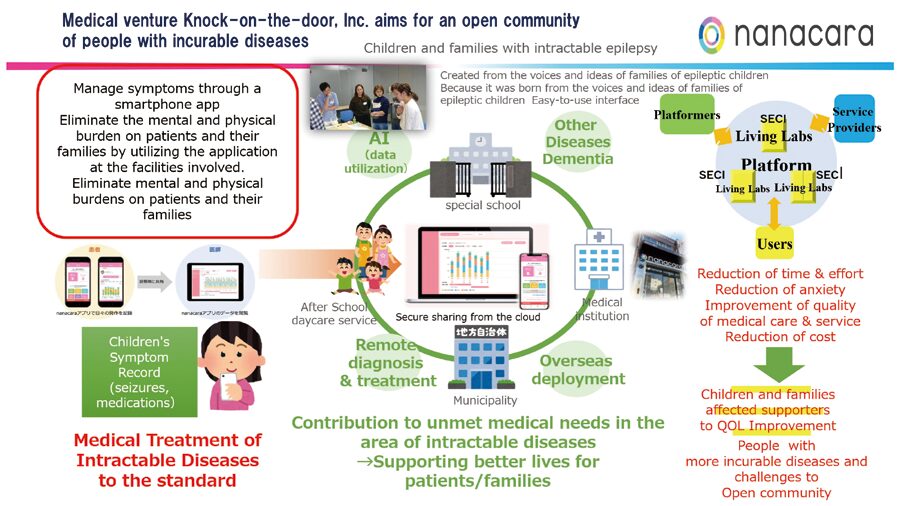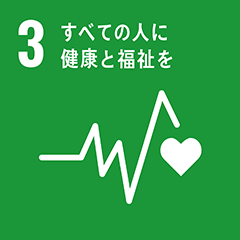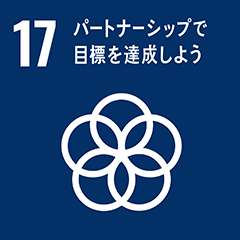Inochi Declaration
From the perspective of Human Healthcare, let us empathize with the lives and concerns of patients and people with disabilities. Let us support one another in realizing the full potential of each individual’s given Inochi, enabling everyone to fully live their own lives with dignity.
“Human Healthcare” is an approach grounded in empathy—connecting with patients and people with disabilities, sharing their lived experiences, and standing beside them in their journey to live out their lives fully and authentically. Inochi does not refer solely to life in the biological or scientific sense, but to the active, human process of living with presence and purpose. Those who have endured illness, disability, or adversity possess a strength born of vulnerability, and they play a central role in regenerating Inochi in society. By learning from them, we can build a society rooted in shared existence—where everyone’s Inochi is respected as a gift, where Inochi is abundant, and where Inochi is interconnected.

The world “nanacara” aims to realize
Eisai Co., Ltd. has made it its corporate philosophy to listen to the insights of people with rare diseases or disabilities, and to take real action to create solutions for them. At the core of this philosophy is the operational logic of “Human Healthcare”—a value system in which the benefit of patients and people with disabilities takes precedence, and business success follows as a result. At Eisai, every employee is required to spend at least 1% of their working hours with patients or people with disabilities, engaging in experiential learning that leads to empathy. Through this process, they internalize the company’s mission. For example, some employees visit L’Arche Kana no ie, a group home for people with intellectual disabilities. There, they encounter the unexpected emotional richness and humanity of the residents, gaining insights that catalyze personal transformation.
This approach has also been extended to community-based initiatives, such as resident-driven Living Labs. These are co-hosted by local communities and companies under pioneering agreements and empower local residents to take the lead in shaping future-oriented ecosystems. A prime example is the smartphone application “nanacara”, developed by Knock on the Door, Inc.
The app allows users to easily record epileptic seizures in real time, track medication and seizure frequency, and share this data with family and physicians. Over a two-year co-creation process involving more than 250 patients and families, the app was designed in response to their wish to easily record seizures using a smartphone. It also reflects the empathy of parents who have experienced the pain of raising a child with a rare disease and who wish to prevent others from enduring the same hardship. From the extraction of latent concerns to design and launch, the development culminated in the release of “nanacara” in March 2020.
Knock on the Door’s mission is to “enable patients with rare diseases and their families to shine with Inochi and live their lives true to themselves.” Their solutions go beyond medical care to support daily life and overall quality of life. Looking ahead, the company aims to develop predictive technologies for epileptic seizures using AI and biometric data. In addition to having established telemedicine infrastructure, they envision tools that interpret facial expressions, vocal signals, and biomarkers to more accurately communicate patient symptoms to physicians. They also aim to leverage AI to recommend optimal diagnoses and therapeutic candidates based on accumulated data. In the context of dementia, such technology could help individuals and families articulate life goals that are aligned with their identity and sense of purpose—fostering mutual understanding and support. By 2026, Knock on the Door plans to build an innovation ecosystem where patients and healthcare professionals co-create transformative solutions on a shared platform.
The Inochi Forum, in collaboration with such organizations, seeks to return to the origins of “Human Healthcare”. It will work to weave together patients, families, healthcare providers, and caregivers into a support network that protects Inochi and helps every person face illness while living their given life in wellness and dignity.
[References]
・Eisai Co., Ltd.
https://www.eisai.co.jp
・Knock on the Door, Inc.
https://knockonthedoor.jp/en/
[Action Platform]
Medical and Welfare
[SDGs]



